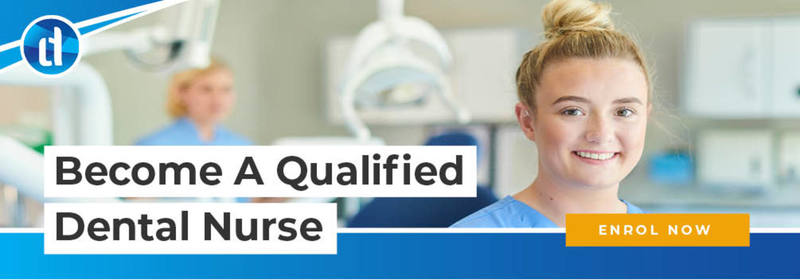Working in dental hygiene means pairing in-depth knowledge of oral care with a genuine interest in helping others.
As a dental hygienist, you’ll be required to perform specialist procedures and treatments. The work you do can often have a major impact on a patients’ oral health.
Although, dental hygienists do more than just clean and polish teeth. They’re educators.
They provide essential information to their patients on how to maintain a healthy mouth, teeth and gums. This allows them to look after their dental hygiene themselves and prevent decay.
This is why dental hygienists play an important part in the oral care sector.
Becoming a dental hygienist can be a fulfilling career path with opportunities to advance your skills further.
No matter what stage you’re at in life it’s never too late to get back into education. Whatever your previous experience or qualifications you’re still able to realise your ambitions in dental hygiene.
What do Dental Hygienists do?

Dental hygienists work with both adults and children in either public or private dental clinics or hospitals. Advising patients how to take good care of their teeth and overall dental health.
They also utilise a broad range of dental instruments to perform dental treatments.
On a daily basis you could be:
- Removing plaque
- Helping prevent gum disease by cleaning and polishing teeth
- Applying fluoride to reduce decay
- Giving local anaesthetic under the supervision of a dentist
- Applying temporary coatings and sealants to help protect the teeth
- Educating your patients on the right way to brush their teeth and floss
- Sterilising equipment pre and post-appointment
- Checking and maintaining patient records so they are up to date for future visits
You’ll also be expected to be an excellent communicator as you’ll be working with many different patients and healthcare professionals.
This includes being able to reassure your patients. Dental clinics can be a cause for anxiety for many so it’s your responsibility to put people at ease. Being sensitive and understanding will ensure you become an asset to your patients and workplace.
How to Start Your Career in Dental Hygiene

To become a fully qualified dental hygienist you need to complete a 2-year foundation degree in oral health science. Or a 3-year undergraduate degree in oral health science, dental therapy or dental hygiene.
Accessing higher education courses requires you to have a range of qualifications to support your application. This is because universities like to know that you are academically capable to work at this level.
Each university can set its own requirements so each institute may vary slightly. Most commonly they’ll ask for the following:
- GCSE maths and English at grade C/4 or above
- 1/2 A Levels or equivalent for a foundation degree
- 2/3 A Levels or equivalent for an undergraduate degree
Relevant A Levels would mean either chemistry or biology, or both.
If you have a specific institute in mind then make sure you check before enrolling on any extra courses. If you’re still unsure then speak directly with the admissions office so you’re 100% clear on what’s required.
An alternative to A Level study would be a level 3 Diploma in Dental Nursing. This dental nursing diploma course can be completed whilst working in a dental clinic. Allowing you to receive on the job training that is highly relevant to your field of study.
The NEBDN National Level 3 Diploma in Dental Nursing
Completing a Diploma in Dental Nursing can help you reach your goal of becoming a dental hygienist. You will learn the core elements of oral care to build on with further study.
The NEBDN National Level 3 Diploma in Dental Nursing is recognised by the General Dental Council (GDC) and the curriculum covers all areas set out within the GDC Preparing to Practice publication.
This dental nursing course covers topics such as:
- Professionalism and the Role of the Dental Nurse
- Health and Safety and Infection Control
- Medical Histories and Medical Emergencies
- Major Systems of the Body and the Saliva Glands
- Anatomy of the Head and Neck, Dental Anatomy and Nerve Supply
- Oral Diseases
- Dental Caries, Periodontal Disease and more
Throughout your dental nursing studies, you will develop your skills and knowledge to prepare you for your assessments. You’ll learn about restorative dentistry, child dental health, pain and anxiety control.
You will also see first-hand the importance of patient care and managing their fear of the dentist. As a dental nurse, you’ll be a support system for many patients throughout their treatments.
Upon completion of the dental nursing diploma, you’ll be a fully qualified dental nurse ready to start your career in oral care. You’ll be qualified to work in a dental clinic, hospital setting or out in the community.
This dental nursing qualification also readies you to take the next step and attend university or complete a dental hygienist apprenticeship, to become a fully qualified dental hygienist.
Career Progression of a Dental Hygienist
Once you have gained experience in the field you could eventually specialise further. This could be dealing with patients with additional needs or you could move into more senior roles such as a dental practice manager.
You could train further and become a teacher for dental hygiene students or move into a related field. Orthodontic therapy is linked with oral care and enables you to advance your career and try something new. A diploma in orthodontic therapy is one year and also needs to be approved by the GDC.
You can also serve in the Royal Navy as a dental hygienist. This requires you to be registered with the General Dental Council before you start basic training.
learndirect is the UK’s leading online learning provider. Online learning is a flexible alternative to attending classes so you can learn without impacting your current schedule. There’s an expert tutor to guide you through your studies and flexible payment options to help you spread the cost.
To learn more about how to prepare for your distance learning journey read our blog here.
Click below to enrol on our new, NEBDN certified and GDC approved, National Diploma in Dental Nursing.
The places for this course are limited so act fast if you’re ready to start your journey in a new career.



















